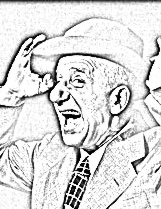Nevada Barr
The Rope is the eighteenth book in Nevada Barr's Anna Pigeon series of crime novels. As has become the norm in crime fiction, the reader is invited to become involved in the life of Anna Pigeon through this series of books. The gimmick, if I may use that word, is that Anna Pigeon is a National Parks police officer and each book is set in a different park. Anna Pigeon novels are a guided tour of the National Park system.
This book is a bit different. It is a flashback to the beginning of Pigeon's career in the Park Service. It gives the reader a lot of background, filling in Anna's history. It's like the birth of the Lone Ranger episode that used to air once a year, which every child waited for with anticipation.
The setting is Glen Canyon National Park and whiffs of Edward Abbey are in the air. Lake Powell laps at the beautiful, stark sandstone sculptures carved, by the wind and the Colorado River over millions of years. Human waste and toilet paper blossoms dot the small beaches found far up side canyons, where houseboaters stop for a night of two of partying. Silt slowly piles up in the bottom of the lake.
Anna Pigeon is introduced as a seasonal park employee assisting a more senior seasonal, in cleaning up the mess left by the partying boaters. Of course there is murder and mayhem. Anna is right in the thick of it, not as an investigator, but as a potential victim. Through grit and determination she manages to survive. What she doesn't do is solve the crime, which is left up to the surprising perpetrator's own mistakes. Nevertheless, there are plenty of clues thrown out and misdirection to keep you guessing. There is even a kind of Alfred Hitchcock moment when you want to shake Anna and tell her to run, as she cluelessly walks into a trap that is obvious to the reader but not to her.
In the end Anna decides that she wants to become a full time Parks employee - in law enforcement. Better to be the cop than the victim. She says that more women should think of themselves as dangerous. I thought everyone knew that women were dangerous.
The Rope is the eighteenth book in Nevada Barr's Anna Pigeon series of crime novels. As has become the norm in crime fiction, the reader is invited to become involved in the life of Anna Pigeon through this series of books. The gimmick, if I may use that word, is that Anna Pigeon is a National Parks police officer and each book is set in a different park. Anna Pigeon novels are a guided tour of the National Park system.
This book is a bit different. It is a flashback to the beginning of Pigeon's career in the Park Service. It gives the reader a lot of background, filling in Anna's history. It's like the birth of the Lone Ranger episode that used to air once a year, which every child waited for with anticipation.
The setting is Glen Canyon National Park and whiffs of Edward Abbey are in the air. Lake Powell laps at the beautiful, stark sandstone sculptures carved, by the wind and the Colorado River over millions of years. Human waste and toilet paper blossoms dot the small beaches found far up side canyons, where houseboaters stop for a night of two of partying. Silt slowly piles up in the bottom of the lake.
Anna Pigeon is introduced as a seasonal park employee assisting a more senior seasonal, in cleaning up the mess left by the partying boaters. Of course there is murder and mayhem. Anna is right in the thick of it, not as an investigator, but as a potential victim. Through grit and determination she manages to survive. What she doesn't do is solve the crime, which is left up to the surprising perpetrator's own mistakes. Nevertheless, there are plenty of clues thrown out and misdirection to keep you guessing. There is even a kind of Alfred Hitchcock moment when you want to shake Anna and tell her to run, as she cluelessly walks into a trap that is obvious to the reader but not to her.
In the end Anna decides that she wants to become a full time Parks employee - in law enforcement. Better to be the cop than the victim. She says that more women should think of themselves as dangerous. I thought everyone knew that women were dangerous.
